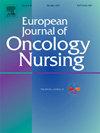Understanding communication experiences of teenagers and young adults with cancer: Analysis of a structured questionnaire
IF 2.7
3区 医学
Q1 NURSING
引用次数: 0
Abstract
Purpose
The purpose of this study was to seek young people's experiences of communication with healthcare professionals following a cancer diagnosis. We specifically sought to explore what are the experiences and preferences for healthcare communication for teenage and young adults with cancer, and how does the presence of a third person impact communication with healthcare professionals?
Methods
We recruited young people with cancer between the ages of 13 and 25, diagnosed in the United Kingdom in the last 5 years. A questionnaire with open ended questions and free text responses was used to collect richer, contextual data related to communication experiences. Free text responses were coded, and codes were collapsed into themes.
Results
A total of twenty-four young people responded to the questionnaire. Participants were diagnosed between 13 and 24 years, predominantly female with representation from across the United Kingdom and several cancer types. Themes included building rapport and trust with healthcare professionals; developmentally appropriate language; and healthcare professionals’ communication skills. Effective communication enhanced understanding, autonomy and reduced negative emotions. Conversely, ineffective communication increased negative emotions and a sense of dehumanisation. Young people wanted to be involved in shared decision making, though preferences varied. The presence of supporters could be both enabling and inhibiting.
Conclusion
This data highlights the positive and negative impacts of (in)effective communication including the role of supporter who accompany teenagers and young adults with cancer during communication encounters. There is a need for further research and particularly the development of specific, multidisciplinary training for healthcare professionals to develop skills to meet the communication needs of this unique patient group.
了解青少年和青年癌症患者的沟通经验:结构化问卷分析
目的本研究的目的是寻求年轻人在癌症诊断后与医护人员沟通的经验。我们特别试图探索患有癌症的青少年和年轻成年人在医疗保健沟通方面的经验和偏好,以及第三方的存在如何影响与医疗保健专业人员的沟通?方法:我们招募了年龄在13到25岁之间的年轻人,他们在过去的5年里在英国被诊断出患有癌症。一份带有开放式问题和自由文本回答的问卷被用来收集与交流经验相关的更丰富的上下文数据。对自由文本响应进行编码,并将代码分解为主题。结果共有24名青少年参与问卷调查。参与者被诊断为13至24岁,主要是来自英国各地的女性和几种癌症类型。主题包括与保健专业人员建立融洽关系和信任;与发展相适应的语言;以及医疗保健专业人员的沟通技巧。有效的沟通可以增进理解、自主,减少负面情绪。相反,无效的沟通会增加负面情绪和失去人性的感觉。年轻人希望参与共同决策,尽管他们的偏好各不相同。支持者的存在可能是有利的,也可能是不利的。结论该数据突出了有效沟通的积极和消极影响,包括在沟通过程中陪伴患有癌症的青少年和年轻人的支持者的作用。有必要进行进一步的研究,特别是为医疗保健专业人员开发具体的多学科培训,以发展技能,满足这一独特患者群体的沟通需求。
本文章由计算机程序翻译,如有差异,请以英文原文为准。
求助全文
约1分钟内获得全文
求助全文
来源期刊
CiteScore
4.40
自引率
3.60%
发文量
109
审稿时长
57 days
期刊介绍:
The European Journal of Oncology Nursing is an international journal which publishes research of direct relevance to patient care, nurse education, management and policy development. EJON is proud to be the official journal of the European Oncology Nursing Society.
The journal publishes the following types of papers:
• Original research articles
• Review articles

 求助内容:
求助内容: 应助结果提醒方式:
应助结果提醒方式:


